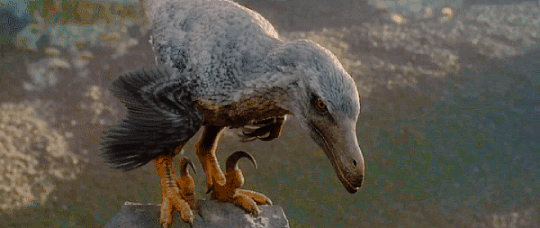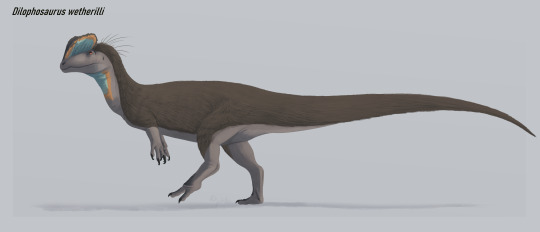Colección de imágenes y textos, ilustrados y escritos por otras personas, que me gustan mucho.
Don't wanna be here? Send us removal request.
Photo






Few land-living hunters venture here. But one does. A type of dinosaur, Velociraptor. Their bodies are kept warm by feathers, but they can’t fly. They are, however, exceptionally agile. And just as well, one false step here could bring disaster.
10K notes
·
View notes
Text

It’s Fossil Friday, so soar into the weekend with Archaeopteryx! When this dinosaur was first described in 1861, it caused a sensation. Discovered shortly after Charles Darwin proposed the theory of evolution by means of natural selection, Archaeopteryx provided an example of evolution in action—a fossil that showed the transition between reptiles and birds. The first Archaeopteryx fossils ever found included exquisitely preserved skeletons with clear imprints of wings and feathers, but also teeth and a bony tail. Today, scientists think Archaeopteryx wasn’t able to fly very well, but the species still represents a turning point in paleontologists’ understanding of the relationship between ancient dinosaurs and modern birds in the design of both its body and brain.
Learn more about the fascinating world of dinosaurs at the Museum!
Photo: © AMNH
2K notes
·
View notes
Text

sketching at the museum
prints available from June 9-16
34K notes
·
View notes
Text

Happy Trilobite Tuesday! This 4-in- (10-cm-) long Olenoides trilobite represents one of the key genera of the Middle Cambrian, and is perhaps the most widely recognized member of the order Corynexochida. The pronounced spines adorning its axial lobe may have served a defensive purpose. Specimens, like this one, might be spotted amid the rocks that line the 500 million-year-old sedimentary canyons of Utah.
531 notes
·
View notes
Text



My 25 years of palaeoart chronology…
My 2023 illustration of Baryonyx fishing, from DINOSAUR BEHAVIOUR, by Prof Michael Benton (published by Princeton University Press). 50% off this book here: https://press.princeton.edu/books/hardcover/9780691244297/dinosaur-behavior?srsltid=AfmBOoo_1LFizac3K0lfT3Y74SSKLvM2S03quY_moV2a-2x320huAJx8
241 notes
·
View notes
Text

You can trick urself into doing background studies by putting dinosaurs in them
1K notes
·
View notes
Text

If you’ve visited the Museum, you’re certainly familiar with today’s Fossil Friday feature: the Barosaurus and Allosaurus in the Rotunda! Rising 50 ft (15 m) above the ground, it’s the world’s tallest freestanding dinosaur mount. In this scene, a Barosaurus rears up to defend her young from an Allosaurus. How does the huge skeleton of Barosaurus—whose name means “heavy reptile”—stay up? The Barosaurus is built from casts of real fossil bones, while the originals are housed in the Museum’s collections. Real fossil bones would be too heavy to support this way.
Spot these dinosaurs and more at the Museum! Plan your visit.
Photo: D. Finnin / © AMNH
824 notes
·
View notes
Text

Another ancient cetacean art, this time Messapicetus Gregarius. Nice to finish this one finally. :)
93 notes
·
View notes
Text

A pair of hunting Excalibosaurus costini.
Doing their thing in a shallow coastal area having chased their prey there for easier pickings. I believe dolphins have been recorded doing this, so why not marine reptiles?
396 notes
·
View notes
Photo

New species of sauropod dinosaur unearthed in Argentina
A new genus and species of rebbachisaurid sauropod dinosaur has been described from fossils discovered at a paleontological locality in the Argentine province of Neuquén.
https://www.sci.news/paleontology/cienciargentina-sanchezi-13826.html
8 notes
·
View notes
Text

Yi also knows as Yi qi. My dear friend challenged me to draw this little guy (*´꒳`*)
2K notes
·
View notes
Text

Magpies resting on a Woolly Rhino concept sketch by Gabriel Ugueto (blueksy)
1K notes
·
View notes
Text




Results from the Flocking #paleostream
Eryops, Plateosaurus, Mahuidacursor and Koreacreatops (original got lost, only screenshot here)
420 notes
·
View notes












